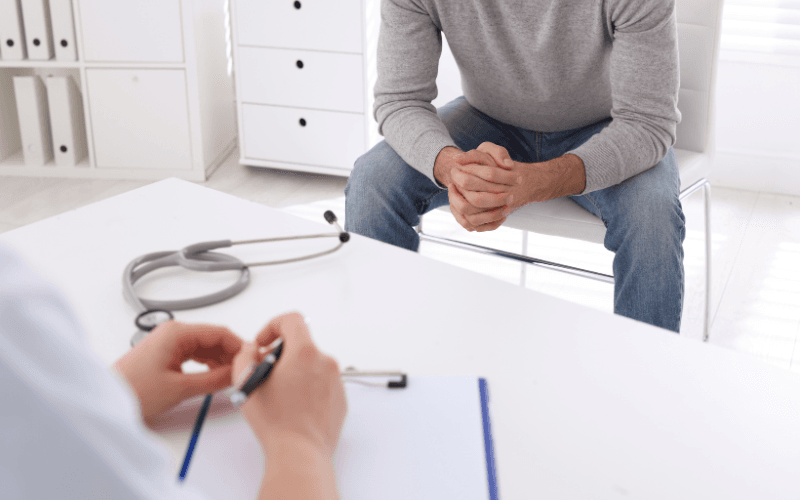
Chlamydia is one of the most common sexually transmitted infections (STIs) in the UK. It often causes no symptoms at all, which is why regular, reliable testing matters. When symptoms do appear in men, they usually affect the urethra (the tube you pee through), but the throat and rectum can be involved depending on exposure. The good news: chlamydia is straightforward to diagnose and treat, and most people recover fully with prompt care.
How chlamydia spreads, and why men may not notice it
Chlamydia passes through unprotected vaginal, anal, or oral sex, and through sharing sex toys. Many men feel completely well, so it can be passed on without realising. If symptoms occur, they typically appear 1–3 weeks after exposure, but they can start later.
Chlamydia symptoms in men
Most men have no symptoms. When present, they’re usually mild at first and easy to miss.
Typical signs affecting the penis/urinary tract:
- A clear, milky, or sometimes yellow discharge from the tip of the penis
- Burning or stinging when passing urine
- Itching, tingling, or irritation at the urethral opening
- Discomfort deep in the pelvis or lower tummy
Testicle and scrotum symptoms (can indicate epididymitis):
- One-sided testicular pain or swelling
- A heavy, dragging ache in the scrotum
Rectal and throat symptoms (depending on exposure):
- Rectal discomfort, discharge, itching, or bleeding
- Sore throat (usually mild and often unnoticed)
Up to 70% of women and 50% of men have no symptoms, which is why tests for sexually transmitted infections are so important. Left untreated, chlamydia can cause long-term damage to fertility, but with prompt treatment, complications are avoided.
If you have severe, sudden testicular pain or a high fever, seek urgent care—testicular torsion and severe infections need immediate assessment.
When to seek same-day advice
Get a same-day GP or sexual health appointment if you have:
- New penile discharge or painful urination
- Testicular pain or swelling
- Rectal pain, discharge, or bleeding after anal sex
- Symptoms after a partner tests positive for chlamydia
- Symptoms that aren’t settling within 48 hours
- Sore throat (usually mild and often unnoticed)
Testing: quick, accurate, and discreet
Diagnosis is simple and highly accurate using a NAAT (nucleic acid amplification test)—often called a PCR test.
- First-catch urine (the first part of the urine stream) is usually enough for penile/urethral testing.
- Swabs may be taken for the throat and rectum if these areas were exposed.
- We’ll often test for other STIs at the same time (gonorrhoea, HIV, syphilis, and hepatitis where appropriate), because co-infections are possible.
Timing matters: NAATs can detect chlamydia from about 7 days after exposure, but for the most reliable result we usually test at 14 days. If you test earlier and it’s negative but you have symptoms or a known exposure, we may advise a repeat test.
Treatment (and how to avoid passing it on)
First-line treatment is usually a short course of antibiotics (for example, doxycycline for 7 days). We choose the right option based on your medical history and any rectal involvement.
- No sex (including oral sex) for 7 days after starting treatment and until all partners have been treated.
- Symptoms often improve within a few days; discharge and urethral discomfort can take a little longer to settle.
- A test of cure isn’t routinely needed if you feel well, but we recommend a repeat test at 3 months because reinfection is common. We’ll arrange this with you.
Partners, privacy, and peace of mind
Your current sexual partners should be told and offered treatment even if they feel well—this helps prevent ping-pong infections. We can support confidential partner notification and work with local sexual health clinics if you prefer. Everything is handled discreetly.
Complications we want to prevent
Untreated chlamydia in men can cause epididymitis (inflammation near the testicle), leading to pain and swelling. Less commonly, it’s linked to reactive arthritis (painful joints with possible eye irritation and urinary symptoms). Fertility problems are rare in men but can occur—another reason to test and treat promptly.
Self-care and prevention
- Condoms (including for oral sex) reduce the risk significantly when used consistently and correctly.
- Test regularly if you have new or multiple partners, or if you’re part of a higher-risk group.
- Avoid sex for 7 days after starting antibiotics and until partners are treated.
- Don’t share sex toys or use condoms on them and clean them between users.
- Come back if symptoms persist or return—don’t assume it will “go away on its own”
Chlamydia FAQs
1. Can chlamydia clear without treatment?
It can linger for months without obvious symptoms. Untreated infection risks complications and transmission, so treatment is always recommended.
2. Does a negative urine dipstick rule out chlamydia?
No. Dipsticks are for general urine changes; chlamydia needs a NAAT test.
3. I took antibiotics for something else—am I covered?
Not necessarily. Some antibiotics don’t treat chlamydia effectively or for long enough. A proper course and follow-up advice are important.
4. How soon after exposure should I test?
From 7 days you may detect it; 14 days is best for a reliable negative. If you test earlier and it’s negative but there’s been a clear exposure, repeat the test.
5. Do I need to tell my partner if I have no symptoms?
Yes. Many people are asymptomatic and can pass it on. Partners should be tested and treated.
Same-day chlamydia testing for men at OneMedicine (Edgbaston, Birmingham)
If you’re worried about discharge, burning when you pass urine, rectal discomfort—or you’ve had a partner test positive—we can help today.
✔ Discreet, non-judgemental care
✔ NAAT (PCR) testing with same-day or next-day results in most cases
✔ Treatment and clear guidance on partners and prevention
✔ Calm, unrushed consultations
✔ Convenient Edgbaston location
Book a same-day STI test with OneMedicine in Birmingham and get answers quickly and privately.
















